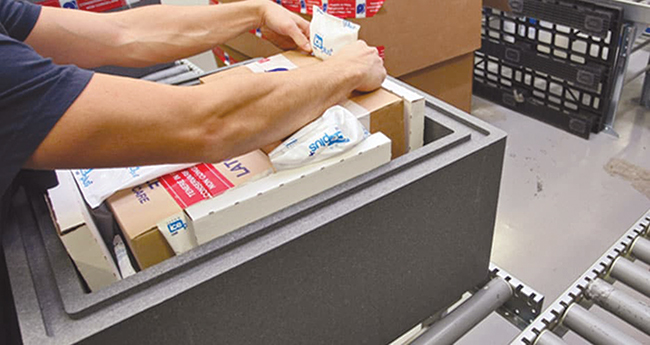
UPS is taking the lessons learned from the coronavirus pandemic to expand its specialty pharmaceutical offerings by establishing UPS Cold Chain Solutions, a suite of technologies, capabilities and global facilities that incorporates those lessons into an integrated logistics platform, the company announced May 24.
“I think COVID had all of us scurrying,” Dan Gagnon, vice president for global health care marketing and strategy at UPS, told Transport Topics, noting that the pandemic and resulting vaccine distribution put pressure on health care logistics companies to quickly adapt. “When that challenge was proposed to us, we found ourselves running all over the place. Different business units engaging on different levels and then at the same time we dramatically increased our investment in certain areas. Freezer farms being one of them, dry ice production.”
UPS Cold Chain Solutions will provide pharmaceutical companies, health care providers and laboratories end-to-end cold chain service offerings, including storage and distribution, transportation, visibility and quality assurance capabilities, the company said.
“It is bringing everything together that we’ve done,” Gagnon explained. “Plus, the new capabilities that we’ve added in the last year, such as dry ice manufacturing, UPS Premiere, which is a tracking technology for our cold chain parcels and the freezer farms.” Once the vaccine distribution was in full swing, the company was able to take a step back and bring everything together into a long-term business, Gagnon said, and noted that being involved early in that process had some advantages.
“We have a division called Marken that was engaged with the clinical trials for all the COVID vaccines early,” Gagnon said. “So I would say that we probably knew better than most what kinds of vaccines were going to be produced. We knew what the temperature requirements were going to be. We understood where these vaccines were going to be produced, where the pre-orders were. So it allowed us to pre-invest specifically for those operating models.”
Gagnon noted that this process also brought to light the opportunity for an end-to-end solution, as UPS was involved from the time vaccines were going through trials and approvals to when the first shots were administered.

“We put in a new quality management system that gives a consistent platform across all activity,” Gagnon said. “We knitted together all of the milestones and activity, whether it happens in a cooler, in a freezer, on an ocean container, an airfreight container, in a small package, active or passive — knitting it all together and selling a full solution that is consistent with quality.”
UPS Cold Chain Solutions is also part of an ongoing strategy to build sophisticated capabilities in cold chain logistics within UPS Healthcare. Gagnon noted the goal is to not just be a logistics company that services health care but instead a health care company that does logistics.
“We’ve had a focus on health care like many of our competitors, but we were a logistics company that was serving health care,” Gagnon said. “The separation of the division is really making sure that people understand that we are a health care company that knows logistics. And it’s an important distinction.”
Gagnon explained that distinction means ensuring supplies are stored appropriately, orders are correct, shipments arrive in the correct place — be it a hospital, clinic or home — as well as ensuring shipments arrive on time and at the correct temperature.
“We do have a focus on the highly regulated, high value, highly perishable, complex health care products,” Gagnon said. “So the overall mission of UPS Healthcare, at the end of the day, is really centered on complex health care.”
Source: ttnews.com
